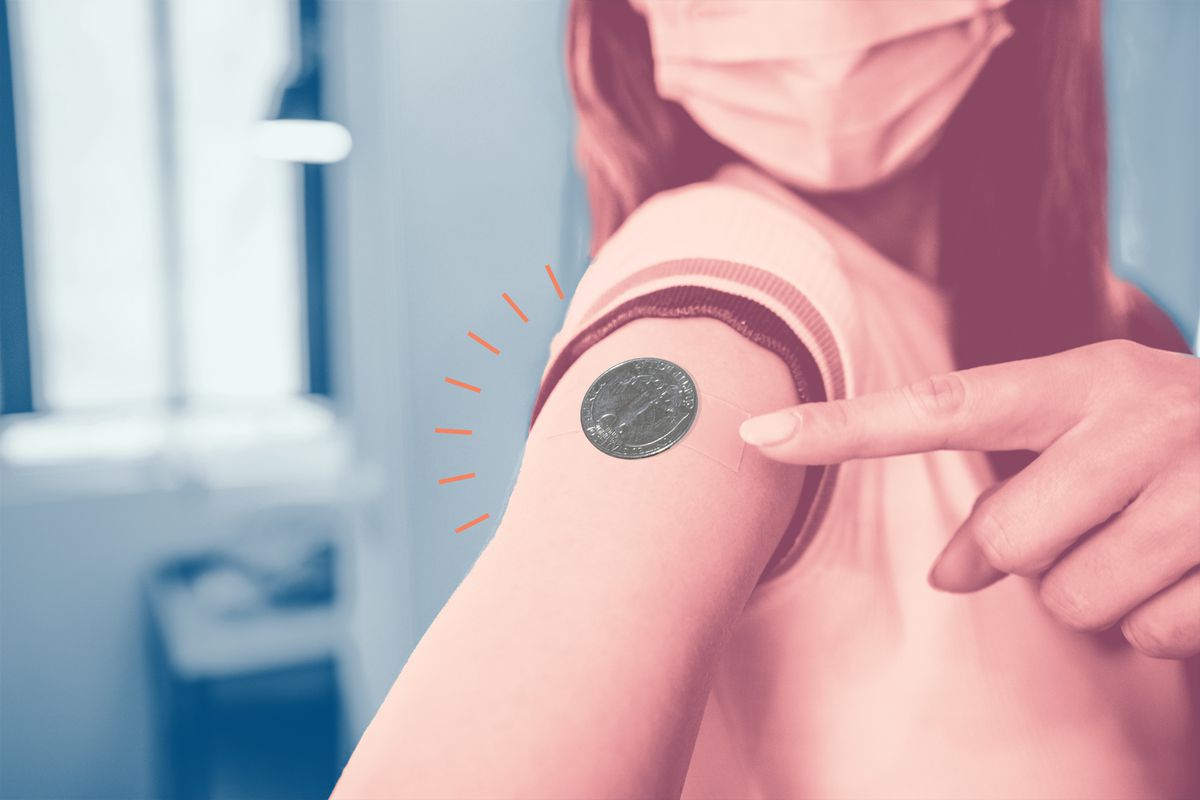
Most people are aware that there are some unusual rumors floating around about the COVID-19 vaccine, like that it will torpedo your fertility or that the vaccine is all a plan by Bill Gates to microchip everyone (both of those are entirely false, by the way). But here's anther one with staying power that could use some clearing up: Some people claim that the COVID-19 vaccine will make a magnet stick to your arm.
People on TikTok have been sharing videos of themselves with magnets stuck to their arms and bodies after getting the COVID-19 vaccine. "When your coworker gets the shot and magnets stick to her arm," TikTok user @pretty_gdimples wrote in the caption of one TikTok. In the video, you can see a magnet sticking to someone as a person in the background says, "How do you feel having a microchip in you?…We told you not to get that sh*t."
She's not the only one floating around this claim-the hashtag #covidvaccinemagnet has about 4.5 million views on TikTok with users doing some variation of the same thing.
Luckily, some of the people posting those videos are trying to debunk the "challenge," like anesthesiologist Magnolia Printz, MD (@balancedanesthsia). She shared a video of herself attempting to stick a series of Magformer magnetic toys to the the arm where she received her Pfizer vaccine. (Spoiler alert: They all fell to the ground.)
Another doc, Jess Andrade, DO (@doctorjess), shared her own video attempting the challenge. "This vaccine magnet thing is CAP," she wrote. (Hint: that means it's not true.)
So what's going on here? Doctors vehemently oppose the idea that the COVID-19 vaccine would make your arm magnetized at all-but here's what you need to know about the "challenge."
Where did people come up with the idea that a COVID shot would make a magnet stick to your arm?
It's hard to say for sure where is started, but magnet idea definitely took off on TikTok, with people both "proving" and disproving that this is a thing.
It seems as though people see this as "proof" that the COVID-19 vaccine somehow functioned as a way to microchip recipients. But this claim has been refuted time and again. The New York Times specifically tackled the false claim, citing the actual ingredients in Pfizer's mRNA vaccine, and it didn't contain any ingredients that even remotely suggested the presence of a microchip. The same goes for the Moderna vaccine, Johnson & Johnson's single-shot vaccine, or any of the other vaccines being used in other countries.
What do doctors have to say about this?
They're not impressed. "This is stupid. This is completely made up," infectious disease expert Amesh A. Adalja, MD, senior scholar at the Johns Hopkins Center for Health Security, tells Health. "There is no new magnetic capacity conferred by being vaccinated."
The Centers for Disease Control and Prevention (CDC) specifically addresses the whole magnetization thing on its website under "Myths and Facts about COVID-19 Vaccines," writing, "receiving a COVID-19 vaccine will not make you magnetic, including at the site of vaccination, which is usually your arm."
COVID-19 vaccines do not contain ingredients that can produce an electromagnetic field at the site of your injection, the CDC explains, noting that all COVID-19 vaccines are free from metals like iron, nickel, cobalt, lithium, and rare earth alloys, as well as any manufactured products such as microelectronics, electrodes, carbon nanotubes, and nanowire semiconductors.
The CDC also includes this: "In addition, the typical dose for a COVID-19 vaccine is less than a milliliter, which is not enough to allow magnets to be attracted to your vaccination site even if the vaccine was filled with a magnetic metal."
You can also check out the full list of vaccine ingredients to verify, if you want to learn more.
OK, so why does the magnet stick to some people?
It's possible that a magnet (and many other objects) could potentially stick to the oils on your skin or even to sweat, Jamie Alan, PhD, an associate professor of pharmacology and toxicology at Michigan State University, tells Health. "People can balance spoons on their nose, so it's not surprising people can balance magnets on their arms," she says.
Another thing to keep in mind: Many people are using coins to "prove" this, but they're missing a huge piece of information: US coins aren't ferromagnetic (aka strongly attracted to a magnet)-that is, except for one specific steel cent made in 1943, according to the American Chemical Society. Though coins are partially made of nickel (which is ferromagnetic), there's not enough in US coins to work that way.
It's also possible that there's a little TikTok trickery going on here. "I guess if you dipped a magnet in honey or slime and then stuck it to your arm, it will probably stick," Dr. Adalja says.
Keep in mind, too, that you're probably willingly putting metal into your body on a regular basis, and it's not turning you into a human magnet. One popular source? Multivitamins, which often contain iron. "The vitamins are so diluted and spread out through your body that they don't cause a magnetic effect," Alan says. And, if you wear any kind of piercing like earrings, you're also placing metal into your body that doesn't make you magnetic, she points out.
The verdict? This is a myth. Full stop.
The information in this story is accurate as of press time. However, as the situation surrounding COVID-19 continues to evolve, it's possible that some data have changed since publication. While Health is trying to keep our stories as up-to-date as possible, we also encourage readers to stay informed on news and recommendations for their own communities by using the CDC, WHO, and their local public health department as resources.
To get our top stories delivered to your inbox, sign up for the Healthy Living newsletter
Source: Read Full Article
